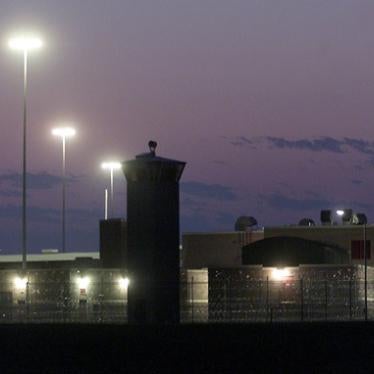(Washington, DC) – The US Congress should build on the progress made in 2013 and enact immigration reform early in the new year, Human Rights Watch said today in its World Report 2014.
In June, the Senate passed a bill that would create a path to citizenship for millions of unauthorized immigrants and allow for greater consideration of the right to family unity in deportation decisions. The bill would have better aligned immigration enforcement and detention practices with US human rights obligations, but it stalled in the House of Representatives.
“Immigration reform should be a top priority for US lawmakers in 2014,” said Alison Parker, US program director at Human Rights Watch. “Congress should seize the nationwide support for immigration reform to create a fairer, more effective, more humane system.”
In the 667-page world report, its 24th edition, Human Rights Watch reviews human rights practices in more than 90 countries. Syria’s widespread killings of civilians elicited horror but few steps by world leaders to stop it, Human Rights Watch said. A reinvigorated doctrine of “responsibility to protect” seems to have prevented some mass atrocities in Africa. Majorities in power in Egypt and other countries have suppressed dissent and minority rights. And Edward Snowden’s revelations about US surveillance programs reverberated around the globe.
Comprehensive immigration reform is crucial, Human Rights Watch said. It should include a path to legal status for undocumented migrants, defend and respect families, protect immigrants from crime and workplace abuses, safeguard their due process rights, and focus enforcement efforts on genuine security threats.
US policy on rights issues improved in a number of areas in 2013, including the renewal of the Violence Against Women Act (VAWA); the US Supreme Court’s decision allowing federal recognition of state-approved same-sex marriages; new Justice Department policies on noninterference with states’ legalization of marijuana and reduced prosecutions of certain drug defendants; and sentencing reforms in California for youth offenders.
Classified documents leaked by the former National Security Agency contractor Edward Snowden in 2013 revealed that the US has secretly used surveillance powers to systematically capture huge streams of data from companies and communications nodes both in the US and abroad, all with minimal judicial and congressional oversight.
In May, President Barack Obama renewed his pledge to close the Guantanamo Bay prison, but 155 detainees remain there, most without charge. At year’s end, legislation was passed that would make it easier for the administration to return detainees to their own or third countries.
The US used aerial drones in targeted killings, particularly in Pakistan and Yemen. In apparent response to criticism of high civilian casualties, Obama in May announced a policy that would limit attacks.
Strikes causing high civilian death tolls raised questions about implementation of the policy, which remains classified. The administration has yet to provide the full legal basis for its targeted killings under US and international law.







